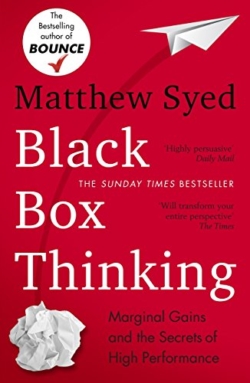Black Box Thinking is all about learning from our mistakes. According to the author, Matthew Syed in his great book with the same name, it also links neatly into having a growth mindset. Can Black Box Thinking help you learn from your mistakes rather than feel threatened by them? It is all about doing and learning from what happens. Being open to feedback. Learning from what went well and not glossing over or covering up what went less well – or was even a big mistake. It is all about applying the richness of these lessons.
As Syed says:
“The single greatest obstacle to progress is failing to learn from mistakes. A cornerstone to success is a progressive attitude to failure. Only by redefining failure will we unleash progress, creativity, and resilience. When we are confronted with evidence that challenges our deeply held beliefs we are more likely to reframe the evidence than we are to alter our beliefs.”
If you are interested in these ideas. It will be worth your while buying the book or watching the TED talk.
Matthew Syed’s book Black Box Thinking – The Surprising Truth About Success here

What is Black Box Thinking?
First, what’s the ‘black box’ analogy about? It comes from the aviation industry. When a plane goes down the craft’s black box – a recording device – reveals what went wrong with the plane’s systems, whether there was a mechanical problem, human error or even a terrorist angle to the crash. If you’re a fan of the TV series Air Crash Investigation, you’ll already know black box tech provides vital insight into errors, so the information can be closely scrutinised and examined in fine detail by experts. In turn they make recommendations for re-training air pilots, changing existing procedures, and creating new, safer designs and materials for aircraft parts.
Because of all this close examination and because the information provided by black boxes is actively used to improve things, air travel has become the safest way to get from A to B, safer than jumping in your car. If there was no such thing as a black box, flying might have remained the lethally dangerous way to travel that it originally was.
It’s concerning to note that the healthcare sector, in sharp contrast, has a mortality rate that can be, at times, traced to preventable medical mistakes. The people who work in healthcare are no different from those who work for airlines, of course. They just have a different skill-set. But the medical industry can sometimes pull out the stops to hide its mistakes rather than examine them, dissect them and make sure they can’t happen again.
Could it be down to ego or people want to avoid being sued? Perhaps but it’s most likely that they are just ‘being human’ within the particular cultural confines of the system they operate in, in the UK’s case the NHS. And that’s why, compared to air travel, healthcare can be more dangerous. Until the industry adopts more black box type thinking, it’ll be less open to adaptation and learning from the mistakes that might then in the future be avoided.

There aren’t any black boxes at work
Now think about your career. Most of us have made a number of silly mistakes at work. But because we don’t have an internal black box, our natural inclinations usually take over. And our natural inclinations are not always helpful.
We can get tripped up by something called ‘cognitive dissonance’. Cognitive dissonance means the more investment we’ve made in our own judgement, the more likely we are to ignore evidence to the contrary. We re-frame our mistakes because it hurts to be wrong. Being wrong damages our sense of professional worth and helps us morally justify not disclosing mistakes. It’s not because we’re dishonest, it’s merely because we’re human. On top of all this, denying mistakes can potentially become more likely the more senior you get. When seniority and cognitive dissonance meet a large ego, the result is usually the very opposite of good business. The same goes for politics.
Self-esteem itself is sometimes overvalued in a work context. Why? It is because too much self-esteem can jeopardise learning, especially when you’re worried about looking anything less than perfect. Resilience matters more than self-esteem on these occasions. You need to develop the ability to face up to failure and actually learn lessons from it.
Self-justification destroys the possibility of learning too. Plenty of us pull out all the stops to prevent our mistakes being surfaced, highlighted, shared and pored over intimately, and because we don’t do it we don’t learn as much from our mistakes as we could. And that’s a great big wasted opportunity.
Aviation versus the healthcare sector – Dramatically different
The book Black Box Thinking: The Surprising Truth about Success reveals how small, undramatic incremental changes can deliver surprising successes. Can you do it at work? Can you apply the same intense learning and the extreme focus to your role? The answer is yes.
If you work for a business that has a blame culture, you might find you’re engaged in an uphill battle. But it’s your job to collect and record the vital data you need to conduct your own investigations. You can bring about improvements in the way you, your colleagues and the wider company operate. It’s time to interrogate your errors to create a workable, formula for future success.
In your new ‘Black- Box’ thinking world errors and near misses are not candidates for the blame game. They’re opportunities to learn and change, to become more effective.
The same concept could be applied to your own career development. It is about having a reflective and inquiring attitude to all you do at work. Seeking to improve and learn everyday. You can create small changes that then add up over the longer term. These small steps can keep movement going and help you be developmentally focused.
What are the small improvements you could bring to your professional development? What everyday steps could you take you? Looking out for new learning opportunities, fosters a mind-set of experimentation and openness to feedback. Learning from your mistakes on a regular basis can become a productive and beneficial professional habit. It moves you forwards and stops you just treading water. This attitude will fuel your initiative and create practical ways in which you build your skills and confidence up over time.
If you would like to explore your development from a number of different vantage points and to set in motion new ‘Black-Box’ thinking habits, do get in touch
About us:
We create the space for leaders to step back, think clearly, and navigate complexity with confidence. By sharpening the narrative that drives decisions, teams, and performance, we help leaders move forward with clarity and impact. Our approach blends deep listening, incisive challenge, and commercial focus—strengthening leadership at every level, from business transformation to boardroom decisions.
“We share resources that help coaches deepen their practice and expand their impact. The articles on this site are designed to spark fresh thinking, offer practical tools, and support the continuous growth of coaches at every stage. “
Jude Elliman
Founder
Our Core Approach:
We work with leaders to sharpen their thinking, strengthen their leadership, and navigate complexity with confidence. Our approach is built around three core areas:
Narrative Coaching – Working with the stories that shape leadership, teams, and organisations.
Commercial Focus – Cutting through complexity to drive clear, strategic decisions.
Challenge & Space – Asking the right questions while creating the space to reflect and grow.
Through this, we help leaders drive transformation, align teams, and make high-stakes decisions with clarity and impact.
